Investing in an SEO tool is a big decision. Marketmuse and Dashword are both strong contenders, but which one offers the best value for your investment? Let’s find out.
Comparison Marketmuse and Dashword
In the ever-evolving landscape of SEO, staying ahead of the curve requires leveraging cutting-edge tools. Both Dashword and MarketMuse offer robust features designed to empower your SEO strategy. This detailed comparison will equip you to determine which platform best aligns with your specific needs and goals.
Marketmuse
MarketMuse takes a data-driven approach to content strategy, providing in-depth insights and personalized recommendations to optimize content for search engines and user engagement. It excels at helping users understand their competitive landscape and create content that resonates with their target audience.
Marketmuse: Overview
MarketMuse is an AI-powered content intelligence platform that analyzes your website, your competitors, and the SERP landscape to provide actionable insights for content planning, creation, and optimization.
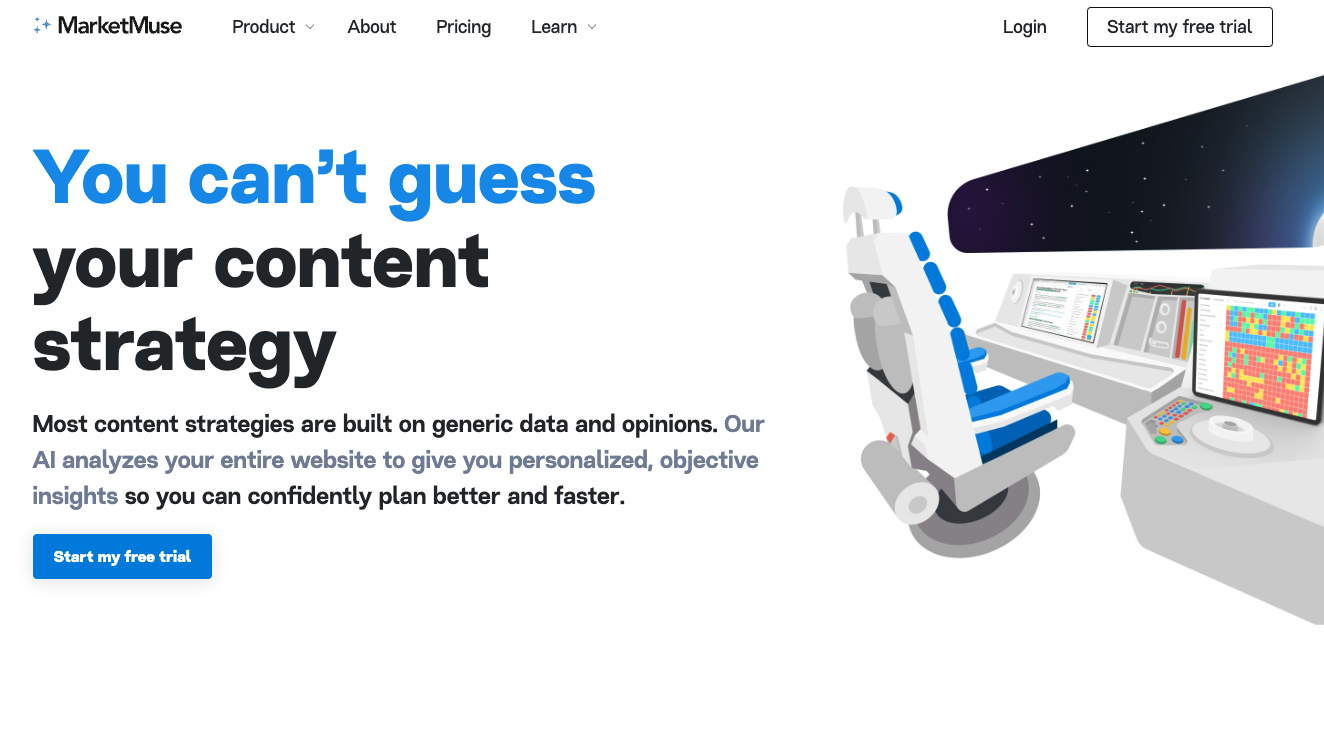
Marketmuse: What It Does
- Content Planning: Identifies content gaps and opportunities, helps prioritize content creation efforts, and facilitates strategic content clustering.
- Content Briefing: Generates detailed content briefs with outlines, keyword suggestions, and competitor analysis to guide writers.
- Content Optimization: Analyzes content for relevance, comprehensiveness, and search engine optimization, suggesting improvements for better performance.
- Competitive Analysis: Provides insights into competitor content strategies, highlighting areas for improvement and opportunities to outrank them.
Key Features of Marketmuse
Personalized content recommendations based on website and competitor analysis
AI-powered content briefs with detailed outlines and keyword suggestions
Content scoring and optimization suggestions for improved performance
In-depth SERP analysis and competitor content gap analysis
Integration with Google Search Console for comprehensive data insights
Who is Marketmuse For?
Content marketers and strategists
SEO professionals and agencies
Large websites with extensive content libraries
Businesses seeking to establish topical authority in their niche
Pros of Marketmuse
- Data-driven insights: Provides granular data and analysis to inform content strategy and decision-making.
- Personalized recommendations: Tailors suggestions to your specific website, niche, and competitive landscape.
- Comprehensive content optimization: Goes beyond keyword density, analyzing content for relevance, comprehensiveness, and user engagement.
- Competitive edge: Helps you understand and outperform your competitors’ content strategies.
- Improved content quality and ROI: Guides the creation of high-quality, relevant content that ranks well and drives results.
Cons of Marketmuse
- Higher price point: Might not be suitable for businesses on a tight budget, particularly smaller companies.
- Steeper learning curve: The platform’s robust features and data-rich interface may require some time to master fully.
- Less focus on technical SEO: While it offers content optimization, MarketMuse doesn’t provide tools for technical SEO audits or backlink analysis.
Data-driven insights
Personalized recommendations
Comprehensive content optimization
Competitive analysis
Improved content quality and ROI
Higher price
Steeper learning curve
Limited technical SEO features
Marketmuse Pricing
- Free: Limited features, ideal for exploring the platform.
- Standard ($149/month): Suitable for individuals or small teams managing moderate content volumes.
- Team ($399/month): Designed for agencies and larger teams handling extensive content operations.
- Premium (Custom pricing): Offers custom solutions for enterprise-level needs.
MarketMuse offers three main pricing plans:
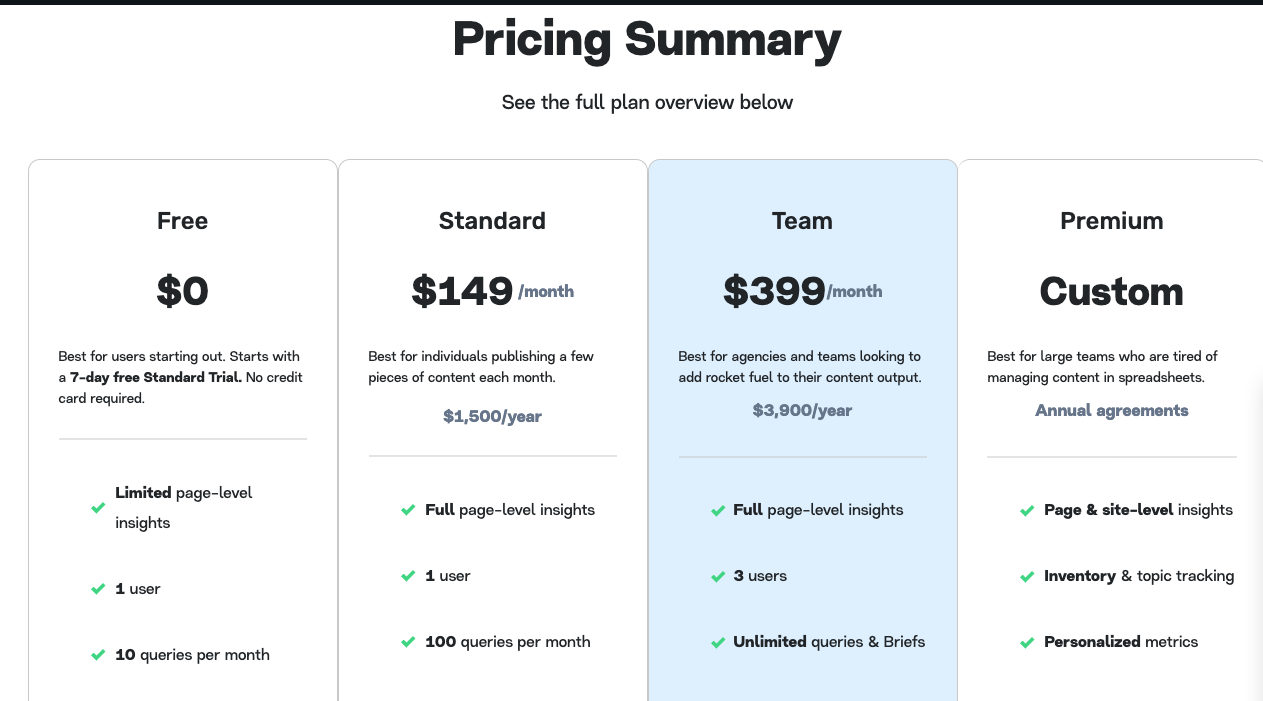
What Users Say About Marketmuse
MarketMuse receives consistently positive feedback from users who appreciate its ability to deliver actionable insights, streamline content workflows, and improve SEO performance. Customers highlight its data accuracy, helpful support, and impact on content ROI.
What’s Missing in Marketmuse
Direct content generation capabilities beyond brief creation
Integration with social media platforms for content distribution
Features specifically designed for local SEO
Final Thoughts on Marketmuse
MarketMuse stands out as a powerful content intelligence platform for businesses serious about data-driven content strategy. Its in-depth analysis, personalized recommendations, and comprehensive optimization tools make it a valuable asset for achieving content marketing success. However, its higher price point and focus on content strategy over technical SEO might not suit every user.
Dashword
Dashword focuses on empowering content creators and marketers to produce high-quality, SEO-optimized content efficiently. With its intuitive content brief builder and real-time optimization suggestions, Dashword aims to elevate content quality while boosting organic visibility.
Dashword: Overview
Dashword is a content marketing platform specializing in content brief creation, SEO optimization, and content performance monitoring.
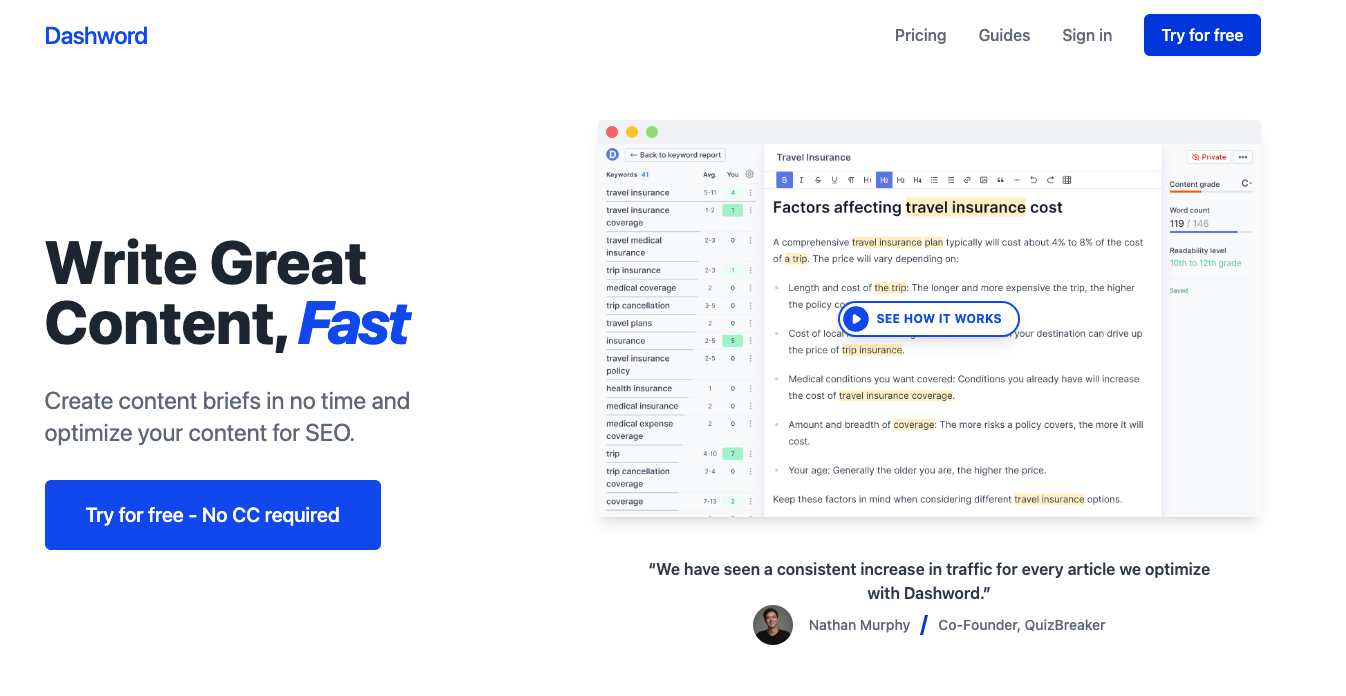
Dashword: What It Does
- Content Brief Builder: Helps create detailed briefs with keyword research, competitor analysis, and content structure suggestions.
- Content Optimization: Provides real-time feedback and scoring based on SEO best practices.
- Content Monitoring: Tracks content performance, identifies underperforming pages, and suggests updates.
Key Features of Dashword
- Competitor Content Analysis: Extracts outlines and key topics from competitor articles for inspiration and strategic content planning.
- Interactive Content Brief Builder: Facilitates collaborative brief creation with an easy-to-use interface.
- Real-Time SEO Feedback: Scores content based on keyword usage, readability, and other SEO factors.
- Automated Content Monitoring: Tracks keyword rankings, traffic trends, and alerts users to content requiring updates.
Who is Dashword For?
Content marketing teams looking to streamline their content creation process.
Businesses wanting to improve the quality and SEO performance of their content.
Agencies managing content creation for multiple clients.
Pros of Dashword
- Content Quality Focus: Emphasizes creating high-quality, well-researched content.
- Collaborative Brief Creation: Facilitates seamless teamwork on content strategy and development.
- Data-Driven Optimization: Provides clear, actionable insights to improve content performance.
- Time-Saving Automation: Automates content monitoring and reporting, freeing up time for strategic tasks.
Cons of Dashword
- Less Comprehensive SEO Features: Lacks some of the all-in-one capabilities offered by Seorocket, such as keyword research and automated publishing.
- Content Optimization Limited to On-Page Factors: Doesn’t offer tools for off-page SEO optimization like link building.
- Pricing May Be Prohibitive for Small Businesses: The Business plan, which includes content monitoring and more extensive features, might be costly for smaller companies or individual bloggers.
Streamlined content brief creation
Real-time SEO optimization feedback
Content performance monitoring and reporting
Collaborative features for teams
Not a full-fledged SEO suite
Focus primarily on on-page optimization
Pricing may be high for smaller businesses
Dashword Pricing
- Startup: $99/month
- Business: Custom pricing (starts at $349/month)
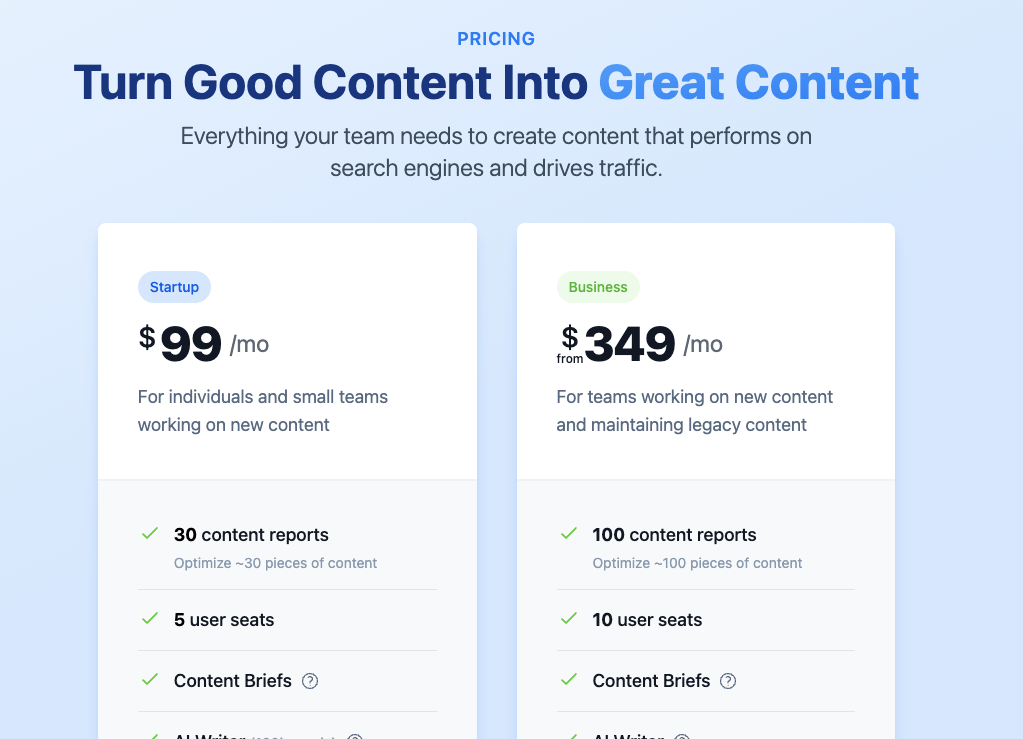
What Users Say About Dashword
Users praise Dashword for its ability to simplify content creation, improve content quality, and increase organic traffic. Many highlight the user-friendly interface and helpful content optimization suggestions.
What’s Missing in Dashword
Keyword Research Tools: Requires users to rely on external tools for comprehensive keyword research.
Content Generation Capabilities: Doesn’t offer AI-powered content writing features.
Limited Integrations: Could benefit from a wider range of integrations with popular marketing tools.
Final Thoughts on Dashword
Dashword shines as a powerful content marketing platform ideal for businesses prioritizing high-quality, SEO-optimized content. Its focus on streamlining the content creation process, providing data-driven optimization suggestions, and monitoring performance makes it a valuable asset for content-focused teams. However, companies seeking a complete SEO suite with keyword research, content generation, and a wider range of features may need to consider other platforms or supplement Dashword with additional tools.
Marketmuse vs Dashword: Which One Should You Choose?
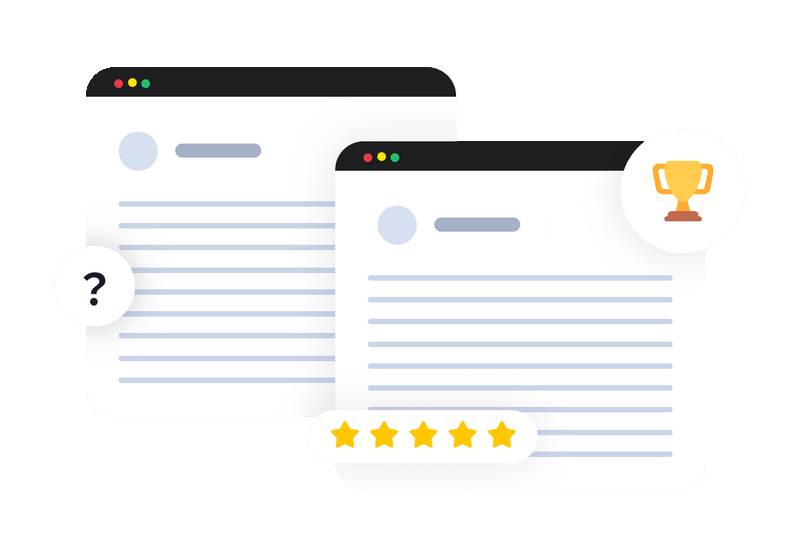
Choose MarketMuse if:
– You require data-driven insights and personalized recommendations.
– You aim to establish topical authority and outrank competitors.
– You have a dedicated budget for content marketing and SEO tools.
Choose Dashword If:
– You prioritize creating high-quality, well-researched content and want a platform dedicated to content optimization.
– You value collaborative features and need a tool that facilitates teamwork on content strategy and creation.
– You seek data-driven insights and actionable suggestions to improve your content’s SEO performance.
search engines ranking patterns to create content that dominates
searches, all without penalty risk.

Why Consider SEOrocket Over Marketmuse and Dashword?
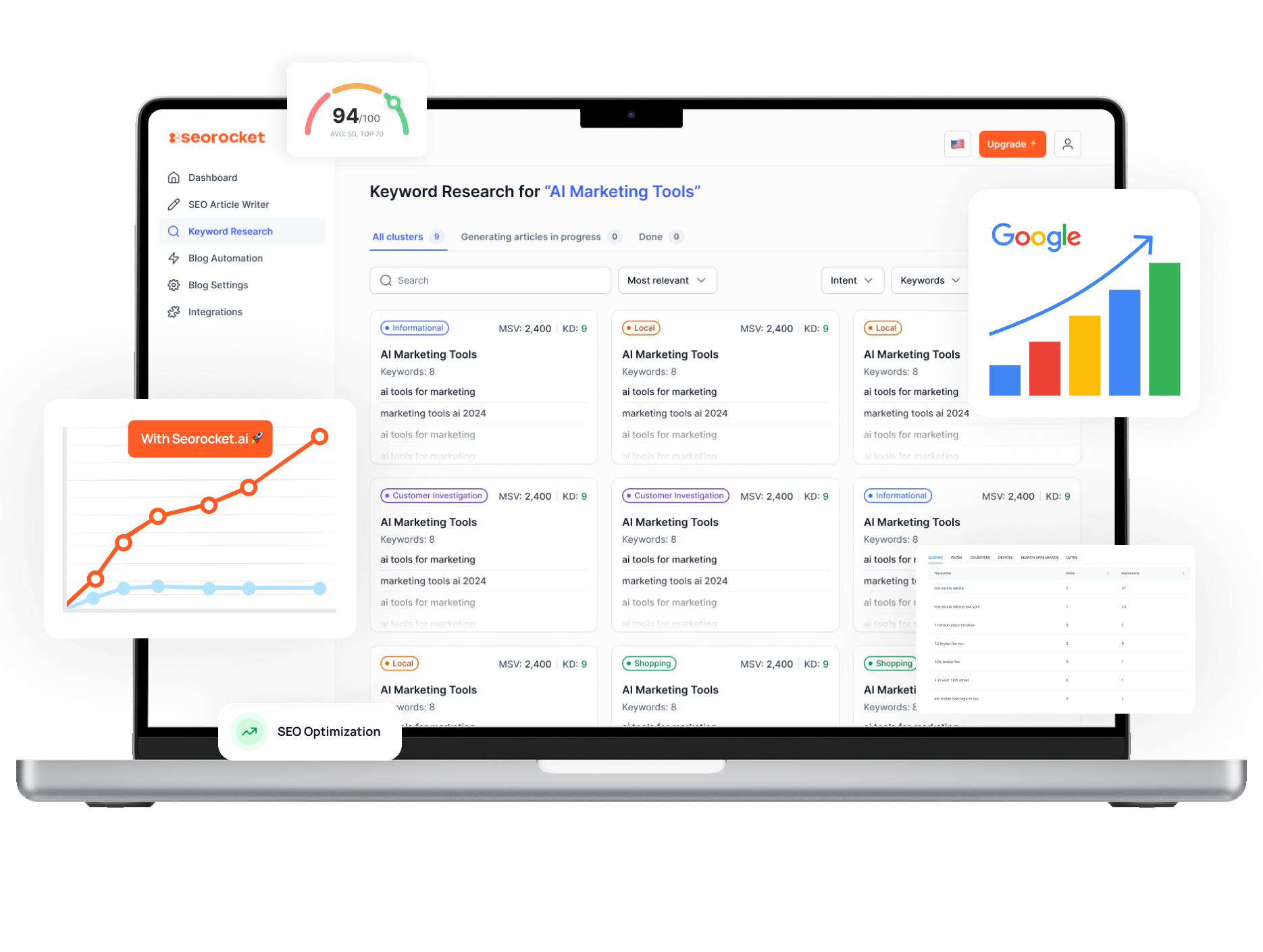
While Marketmuse and Dashword AI are strong contenders in the content optimization and generation landscape, Seorocket stands out as a comprehensive and cost-effective alternative. Here’s why:
By choosing Seorocket, you can streamline your content marketing efforts, save time and resources, and achieve significant improvements in your search engine rankings.




